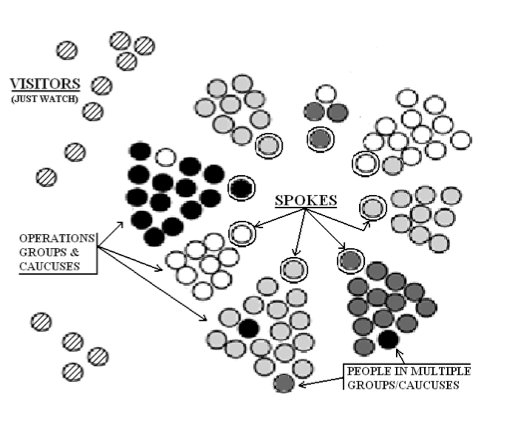by Patrick J. Young
Last September, when young people called for global climate strikes, organizers in DC answered that call in a big way. On September 23rd, 2019 hundreds of people organized into 22 different affinity groups to blockade 17 intersections across Washington, DC, effectively shutting down business as usual in the nation’s capital. The mobilization brought together a wide range of people spanning from healthcare workers to union activists to college students to Black Lives Matter to, of course, traditional climate activists. One group led a massive queer dance party through the streets, another group set up a mobile blood pressure clinic in the middle of Independence Avenue, and yet another locked down to a boat in the middle of K Street.
The organizing for #ShutDownDC came together incredibly quickly — in just about five weeks — but it wasn’t random and it wasn’t spontaneous. To make this happen we relied on tried and tested organizing practices and social movement theory to very deliberately execute a disciplined organizing program.
This spring, young people from around the world are calling on all of us to take to the streets again to take action for climate justice. Using some of those same tools, learning from our experience, and building off of the base that we’ve created we can #ShutDownDC again — and we can do it much bigger and more powerfully than we did in September.
Pledging to Take Action
When we launched the call to action to participate in #ShutDownDC we invited people to sign a pledge of resistance committing to take action.
This September I will join the climate strike.
- I will honor the picket line by skipping school or work and putting off my other responsibilities on September 23.
- I pledge to take action with my friends, neighbors, classmates and coworkers to shut down business-as-usual, so the status quo of delay, inaction, and half measures is no longer an option.
- I’m going to make the strike a priority. Between now and September I’m committed to pushing myself to organize my friends, coworkers, classmates and neighbors to participate in the strike.
- During the climate strike in Washington, DC we will hold ourselves accountable to building creative and strategic nonviolent actions that bring about the world that we want to live in.
The pledge of resistance model has been used in the past by dozens of projects, notably the anti-nuclear movement, the Central American Pledge of Resistance, and the fight against the Keystone XL Pipeline. This was an important step for #ShutDownDC because, not only did it offer an invitation to participate in the mobilization, it also helped us start to build a list of collaborators and co-conspirators. When we kicked off the project #ShutDownDC was a brand new space and we didn’t have a list of activists or a base.
Importantly, we didn’t just rely on people signing an online pledge to assume that they were going to take serious action in September. We used the contact information from the pledge to call and text everyone who signed on to invite them to take the next steps and get the support they needed to seriously throw down in September. We had one-on-one phone calls or peer-to-peer text conversations with everyone who signed the pledge at least once a week between mid-August and the end of September.
Decentralizing the Organizing
Doing something as complicated as blockading intersections around a major city is something that’s far too complex for any one action organizer — no matter how smart or experienced — to coordinate. Taking on a project like that meant coordinating hundreds of people to make quick decisions and adapt to changes in traffic flows, police actions (there are more than two dozen police agencies in DC), and commuters across more than a dozen square miles.
To solve a problem this big we borrowed a tool that has been adopted by radical social movement spaces successfully all around the world hundreds of times going back as far as the Spanish Civil War. We organized into smaller “affinity groups” that could take on pieces of the action — blocking an intersection or a part of an intersection. We coordinated about big decisions that impacted everybody — like when to start (it could be a big problem if one group shut down traffic an hour earlier than everybody else… and then nobody could actually get to their blockades!) or when to end, or what our shared demands would be through a Spokes Council.

A Spokes Council is a space that brings together representatives (or ‘spokes’) from different affinity groups to coordinate on co-creating an action. Spokes Councils operate on a formal consensus model where groups work together to find solutions that address everyone’s needs and concerns and develop a plan that everyone is comfortable with.

There’s something profoundly radical about this model of organizing. Rather than waiting for leaders to tell us what to do, we worked together in small groups to solve problems and make plans on our own. When our decisions just impacted us (like whether to make our banners out of nylon or cotton) we did whatever made sense to us. When our affinity group’s decisions impacted everybody else, we communicated with those groups to find solutions that everybody could live with.
Frontloading Movement DNA
Because this action was so ambitious — shutting down the capital of the most powerful country in the world — and this model of decentralized and horizontal organizing was so different from so many other spaces in our culture it was important to introduce people joining us to the project and the way we were organizing ourselves early on. To make this happen we held regular on-boarding sessions to introduce everyone to the structure, organizing plan, and strategy of the action.
These onboarding sessions were short — they lasted about an hour — and were primarily focused on giving people the information they needed to step into the structure and start making plans. Other movements including Otpor! in Serbia and groups incubated by Momentum in the US have very successfully used this model of front-loading training to take advantage powerful waves of mobilization and absorb energy back into their organizing structures as initial bursts of energy began to recede.
Many of the people who took to the streets on September 23rd had never participated in any sort of direct action, and very few had participated in this type of decentralized action planning framework in the past, so we held a series of Nonviolent Direct Action Trainings to make sure that everyone had the tools and skills to feel comfortable and safe taking action to #ShutDownDC.
Measuring Our Progress
Coming through the onboarding sessions, spokes council meetings and NVDA trainings people had never taken action before were able to build relationships and find their way into an affinity group where they felt comfortable taking action. The #ShutDownDC Organizing Working Group carefully tracked who signed the pledge of resistance, who went to an onboarding training, who went to an NVDA training and who was landing in an affinity group.

People who signed the pledge of resistance but hadn’t shown up to a meeting or event got phone calls and text messages inviting them to an onboarding training. People who hadn’t connected with an affinity group got introduced to affinity groups at weekly spokes council meetings. Building energy and buzz around an action is great, but if we’re going to take on big, complicated actions and take serious risks we need to build structures of coordination and accountability so we can depend on each other to show up.
At the start of the organizing process we set up a realistic set of benchmarks about how many people needed to be in motion, how many pledge signers, how many people participating in onboarding sessions, how many people in affinity groups at key points throughout the process. And at signpost after signpost we met our targets and drove the organizing forward.
By the weekend before September 23rd there were around 550 people who were organized into affinity groups with a concrete plan to take action. By the end of the day, around four times that many actually turned out into the streets — some of them had just heard about the action online or on the news, but many, many more were friends, neighbors, coworkers and roommates of the 550 people who had organized into affinity groups over the previous two months to make the action happen.
What We Can Do This Spring!
The action that we came together to create in September exceeded just about everyone’s expectations about what we would be able to organize in that timeframe. In many ways it was a mammoth organizing task: bringing together a group of people, most of whom had never met each other, many of whom had never taken action and shutting down business as usual in Washington, DC. But on the other hand, when we break it down to the component parts of organizing, training and supporting around 550 people in 22 affinity groups, it’s a much more manageable project.
This Spring we’re not starting from scratch. Hundreds of people cut their teeth in action organizing in September. And over the past four months, more than 200 people who weren’t involved in the September actions in any way have joined our ranks and come to meetings, trainings, or thrown down with us on smaller-scale actions. We also have some functioning working groups (and some working groups that need some energy to become better functioning!), a big contact list, and a whole lot more experience.
We’ve also been doing a lot of listening and learning. Over the past six weeks, #ShutDownDC organizers have participated in an ambitious consultation process where we’ve had listening meetings with organizers from around 50 organizations and movements. The point of these meetings was not to try to recruit these organizations into a process; it was to get feedback on how folks have experienced or perceived #ShutDownDC and the climate movement in the past, hear what type of action or mobilization folks would be excited about seeing happen in the spring, and if they wanted to participate in co-creating a mobilization, what they would want and expect from an organizing process to feel good about working together in that space.
With this kind of foundation, we shouldn’t be looking to replicate what we did in September, we should be thinking about bringing the action to a whole new scale. Around 550 people were organized into affinity groups and had solid plans to take action in September — there’s no reason we shouldn’t be able to organize three or four times as many people into affinity groups ready to throw down hard this spring. And there’s no reason that we shouldn’t be able to organize actions at that scale across several days — or even a week!
We’re having our #ShutDownDC kick-off meeting this Thursday and I’m excited to see what we can make happen. There are a lot of different ideas floating around and lots of different possibilities. One proposal that I’m particularly excited about is organizing a series of actions stretching from Earth Day to May Day, supporting youth-led actions on April 22–24 and organizing a series of escalating days of action lifting up different themes and struggles throughout the week of April 27, culminating on May Day. I’m not sure what we’re going to end up doing, but I think that if we can think big, learn from our experiences, take leadership from the organizations in our community that have been in struggle for decades, and run a disciplined organizing program, we can create a history-making level of disruption this spring.






